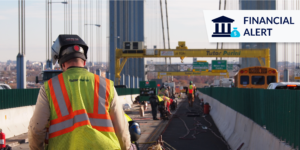
Issues surrounding payment hold back contractors nationwide, as it’s a common problem within the industry. Major contractor Tutor Perini Corporation — reportedly the seventh-largest contractor in the country — recently got a reminder that payment issues don’t stop for bigger companies, either, as its CEO Ron Tutor noted that issues with payment in the public sector were having a major adverse effect on the company’s ability to sustain revenue and profits.
According to the company’s results from the third quarter of 2021, Tutor Perini has seen its revenues fall 18% from 2020’s reports.
Tutor noted that the company’s revenue struggles were directly connected to a lack of prompt payment, specifying that Tutor Perini just hasn’t been able to receive payment from clients in the public sector.
“Covid has constrained some of our customers’ revenue and funding sources, thereby limiting their ability and budgetary discretion to pay us timely for certain in-scope work, as well as some out-of-scope work that we have performed at their direction,” said Tutor Perini CFO Gary Smalley.
The company has additionally had to resort to making abnormal deals with clients just to secure some promise of payment. Talking of one such project, Tutor said “We agreed to lend the owner back $28 million that he could pay us on a large public works project and pay 6% interest, and gave him over a year to pay us back…That’s the kind of madness we’re dealing with.”
Unfortunately, this has had the effect of forcing Tutor Perini to dip into its own cash in order to cover the cost of its clients’ nonpayment — something that contractors too often have to do.
“As a result [of payment problems], we have had to temporarily fund certain project costs that would normally be more promptly negotiated, billed to and collected from these customers, which has negatively impacted our operating cash flow,” Smalley noted.
As per Levelset’s 2021 Construction Cash Flow & Payment Report, this is one of the main things that contractors have had to contend with during 2021: “Gaps in cash flow can deplete even the safest margins: late payments cause reduced profit for 43% of construction companies, and nearly 1 in 3 are forced to finance cash flow gaps adding interest and other carrying costs that affect the bottom line.”
When asked what could help with increasing the level of prompt payment on projects, Tutor specified that “Passage of the infrastructure bill” was the most important thing — with this desire proving more in-tune than expected, as the bill’s passage followed Tutor’s comments by just a few days.
With this boost, the company is expecting that its payment fortunes will turn back around in 2022, hoping for patience from its partners and investors.
“The Company has recently bid and is preparing to bid on certain large projects, with potential awards anticipated later this year and during the first half of 2022,” Smalley added. “The Company also expects to benefit over the next several years from a significant amount of anticipated incremental federal government funding for various critical infrastructure projects, particularly if federal infrastructure legislation currently being considered by Congress is adopted and funded.”
Tutor Perini isn’t the only organization that’s expecting to see a major boost from the passage of the federal infrastructure bill. Jim Tymon, executive director of the American Association of State Highway and Transportation Officials (AASHTO), noted that “a lot of folks in the transportation industry are in limbo,” with some state officials noting that they are “heavily reliant” on federal money that is currently held up until after President Biden officially signed the new infrastructure bill on November 15, 2021.
Tutor Perini has had struggles in the past, especially with federal projects
Even despite its well-known status, Tutor Perini has had a difficult time getting prompt and correct payment for major projects in the past few years.
In September 2020, the company had to file a $4.3 million lien on the Metropica Tower One construction project in Florida, stemming from the company’s original $78.8 million contract on the project. Additionally, a number of subcontractors hired by Tutor Perini also had to file mechanics liens on the project.
Tutor Perini has a long-standing reputation for causing clients problems with payment, however, with an alleged history of accusations of “change-order scheming” that has jeopardized some aspects of the company’s dealings with government organizations.
Despite these struggles, Tutor Perini expects to be able to regain its revenue streams in the near future. The company may also see benefits from lower competition, to its bidding processes. “The projects I spoke to had no more than a total of three bidders, and in most cases two, which should continue to lead to strong operating margins and growth for our civil segment,” Tutor said.
“My assumption is by next summer, we will have achieved such a significant backlog [of bids won and not yet begun], beyond anything we ever dreamt of,” Tutor added. “As that catches up, our revenue will increase accordingly, and with it, the profit. But the work has got to get released, COVID’s got to get put behind us, and these government fundings have to happen.”